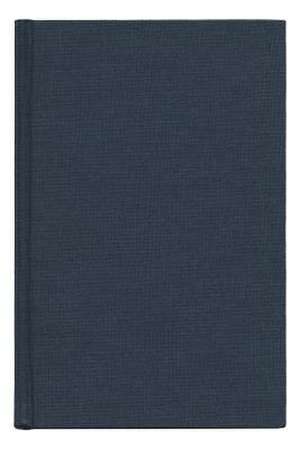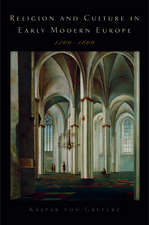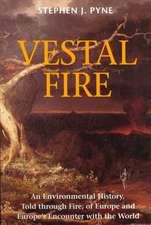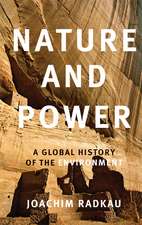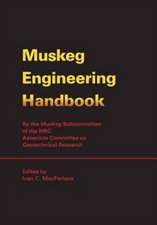DDT, Silent Spring, and the Rise of Environmenta – Classic Texts: DDT, Silent Spring, and the Rise of Environmentalism
Autor Thomas Dunlap, William Crononen Limba Engleză Hardback – 13 sep 2015
Beginning with attitudes toward nature at the turn of the twentieth century, the book moves through the use and early regulation of pesticides; the introduction and early success of DDT; the discovery of its environmental effects; and the uproar over Silent Spring. It ends with recent debates about DDT as a potential solution to malaria in Africa.
| Toate formatele și edițiile | Preț | Express |
|---|---|---|
| Paperback (1) | 147.28 lei 6-8 săpt. | |
| MV – University of Washington Press – 19 aug 2008 | 147.28 lei 6-8 săpt. | |
| Hardback (1) | 630.97 lei 6-8 săpt. | |
| MV – University of Washington Press – 13 sep 2015 | 630.97 lei 6-8 săpt. |
Preț: 630.97 lei
Preț vechi: 819.44 lei
-23% Nou
Puncte Express: 946
Preț estimativ în valută:
120.81€ • 125.80$ • 100.24£
120.81€ • 125.80$ • 100.24£
Carte tipărită la comandă
Livrare economică 14-28 februarie
Preluare comenzi: 021 569.72.76
Specificații
ISBN-13: 9780295998947
ISBN-10: 0295998946
Pagini: 160
Dimensiuni: 152 x 229 x 15 mm
Greutate: 0.39 kg
Editura: MV – University of Washington Press
Seria DDT, Silent Spring, and the Rise of Environmentalism
ISBN-10: 0295998946
Pagini: 160
Dimensiuni: 152 x 229 x 15 mm
Greutate: 0.39 kg
Editura: MV – University of Washington Press
Seria DDT, Silent Spring, and the Rise of Environmentalism
Cuprins
Notă biografică
Recenzii
A superb collection. Included here are the texts that galvanized Rachel Carson to write Silent Spring and inspired her to insist on a new vision of cooperation between man and nature. Dunlaps book provides the context for one of the defining debates of our time and shows us why a resolution remains so elusive. Linda Lear, biographer and author of Rachel Carson: Witness for NatureTo understand how DDT could win its developer a Nobel Prize and then be banned just decades later, read this book. Read it, too, if you want to understand the modern environmental movement. In these pages, those who helped make history tell you, in their own words, what happened. Edmund P. Russell, University of VirginiaThis is a wonderful collection that will prove quite useful for classes in environmental studies and American environmental history. Rachel Carson deserves far more attention in undergraduate courses, and this collection will facilitate that. Historians studying conflicts over pesticides will also find the selections thought-provoking and occasionally surprising. Nancy Langston, Professor, Nelson Institute for Environmental Studies, University of Wisconsin-Madison A fascinating and thought-provoking collection of texts that will give readers whole new perspectives on this critical controversy in the history of environmental thought. William Cronon, University of Wisconsin-MadisonStudents can use this collection to gain greater understanding of the development of the environmental movement, changing ideas about progress, science, and technology, as well as changing ideas about the role of nature in the modern world. David Stradling, University of Cincinnati
"A superb collection. Included here are the texts that galvanized Rachel Carson to write Silent Spring and inspired her to insist on a new vision of cooperation between man and nature. Dunlap's book provides the context for one of the defining debates of our time and shows us why a resolution remains so elusive." Linda Lear, biographer and author of Rachel Carson: Witness for Nature "To understand how DDT could win its developer a Nobel Prize and then be banned just decades later, read this book. Read it, too, if you want to understand the modern environmental movement. In these pages, those who helped make history tell you, in their own words, what happened." Edmund P. Russell, University of Virginia "This is a wonderful collection that will prove quite useful for classes in environmental studies and American environmental history. Rachel Carson deserves far more attention in undergraduate courses, and this collection will facilitate that. Historians studying conflicts over pesticides will also find the selections thought-provoking and occasionally surprising." Nancy Langston, Professor, Nelson Institute for Environmental Studies, University of Wisconsin-Madison "A fascinating and thought-provoking collection of texts that will give readers whole new perspectives on this critical controversy in the history of environmental thought." William Cronon, University of Wisconsin-Madison "Students can use this collection to gain greater understanding of the development of the environmental movement, changing ideas about progress, science, and technology, as well as changing ideas about the role of nature in the modern world." David Stradling, University of Cincinnati
"A superb collection. Included here are the texts that galvanized Rachel Carson to write Silent Spring and inspired her to insist on a new vision of cooperation between man and nature. Dunlap's book provides the context for one of the defining debates of our time and shows us why a resolution remains so elusive." Linda Lear, biographer and author of Rachel Carson: Witness for Nature "To understand how DDT could win its developer a Nobel Prize and then be banned just decades later, read this book. Read it, too, if you want to understand the modern environmental movement. In these pages, those who helped make history tell you, in their own words, what happened." Edmund P. Russell, University of Virginia "This is a wonderful collection that will prove quite useful for classes in environmental studies and American environmental history. Rachel Carson deserves far more attention in undergraduate courses, and this collection will facilitate that. Historians studying conflicts over pesticides will also find the selections thought-provoking and occasionally surprising." Nancy Langston, Professor, Nelson Institute for Environmental Studies, University of Wisconsin-Madison "A fascinating and thought-provoking collection of texts that will give readers whole new perspectives on this critical controversy in the history of environmental thought." William Cronon, University of Wisconsin-Madison "Students can use this collection to gain greater understanding of the development of the environmental movement, changing ideas about progress, science, and technology, as well as changing ideas about the role of nature in the modern world." David Stradling, University of Cincinnati
Descriere
Descriere de la o altă ediție sau format:
Presents readings on the controversy over DDT (notably Rachel Carsons Silent Spring) and examines shifting attitudes surrounding the use of pesticides.
Presents readings on the controversy over DDT (notably Rachel Carsons Silent Spring) and examines shifting attitudes surrounding the use of pesticides.
